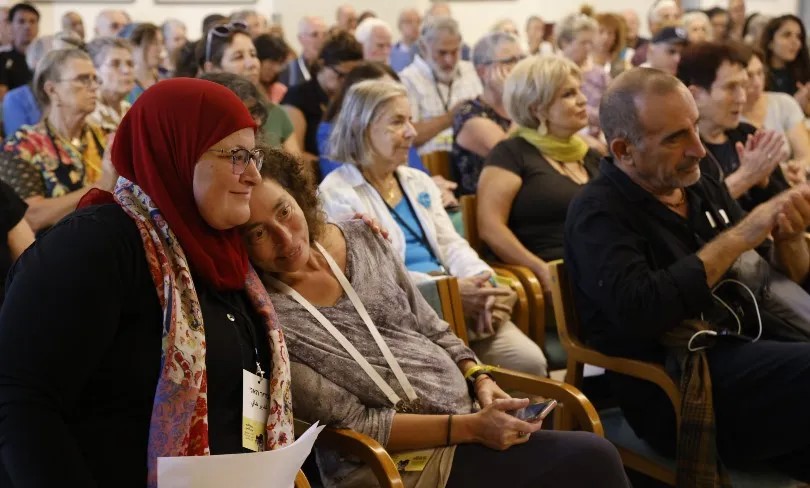
On October 9 2024, hundreds of Arabs and Jews from throughout Israel — including Jewish gap-year participants and young Bedouin — poured out of buses in front of Hebrew Union College. They were attending the “A Day of Pain; A Day of Hope,” event in which Shatil (NIF’s action arm) was a lead organizer. The aim of the day was to create an intimate environment for Jewish and Arab-Israelis to reckon with their fears, losses, traumas, and hopes for the future as the war enters its second year.
The conference was part of NIF’s new “Equality and Partnership in the Negev” program to promote inclusive and comprehensive rehabilitation for all Negev residents and bolster Jewish-Arab partnership and progressive voices there. While 101 Israelis are still being held hostage in Gaza, and war rages on, Shatil is acutely aware of the need for collective healing. This means honouring the diverse struggles and contributions of all Negev residents, particularly the Bedouin who historically have been marginalized or excluded. The conference was a first step in this process.
Following welcomes, participants divided into groups to share and listen to others’ painful experiences and feelings incurred by October 7 and the war. The stories reflected the group’s diversity of ages and backgrounds. A young Jewish woman who volunteers with a joint Jewish-Arab project in the Negev wept over her friends who were murdered on October 7 and for the unreturned hostages. Her sense of existential fear for Israel resonated with other Jews in the group. A young Bedouin woman’s body shuddered with sobs as she recounted the killing of her cousins in Gaza. Another Bedouin woman’s cousin was killed in Gaza during his first days of his IDF service there. And an Arab woman from Akko was threatened by both Jews and Arabs because of her social media posts encouraging Arab-Jewish cooperation. The discussion was lively — in typical Israeli fashion — with responses of support, advice, and differing opinions on strategies for moving forward intertwining.
The afternoon session challenged participants to talk about hope. A woman from a Gaza border community said: “I need my daily actions to ensure that my son-in-law’s murder was not for naught.” Others spoke of work with youth, with Arab Jewish educators, and activism as sources of hope for a peaceful future. The day concluded with a ceremony of songs, poems, and prayers in Hebrew and Arabic.
Shatil consultant Asaf Raz, one of the event’s organizers, reflected on the event: “We planned this event for 50 people, and hundreds signed up. The fact that some 250 people attended, including a strong Arab presence and many young people, reflects good coordination among the 22 organizations (including NIF grantees Abraham Initiatives and AJEEC-NISPED) that planned the day.”
He continued: “This shows us just how important it is to provide safe spaces for open discussions, and for Jews and Arabs to find sources of hope in the current reality, in order to build for a better future.
